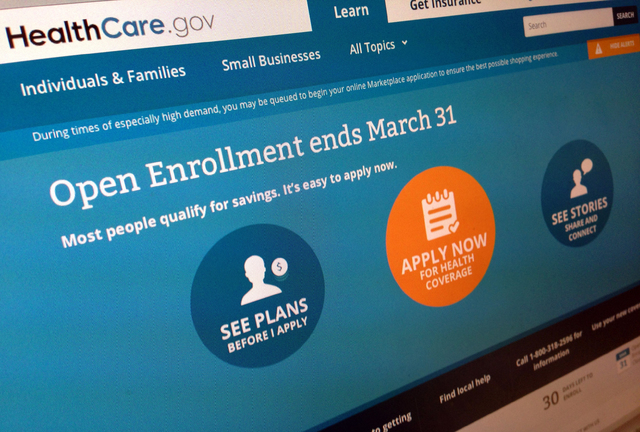Who can buy health care coverage and when can be confusing
No matter how much you think you understand health insurance, someone will always throw you a scenario you didn’t expect.
That’s the case with John McGrail of Las Vegas.
Our discussion a while back on who can buy coverage and when left him a little confused. We noted that most people have to wait until open enrollment from November to February to buy a policy or have a plan take effect unless they have a “qualifying life event.” That’s fed-speak for losing a job or company-sponsored insurance plan, having a baby, getting married or divorced, or relocating. What’s not a qualifying life event? Illness. You can’t buy coverage just because you got hurt and you need it now.
The idea behind limiting enrollment to winter is to stop people from waiting until they’re sick to buy a plan. Otherwise, the theory goes, pretty much only ill people would bother with coverage, and premiums would skyrocket.
But John asked: “If you get cancer or break a leg and you can no longer work, is not the loss of your job and the loss of income a qualifying life event that allows you to sign up immediately?”
Boy, that would be one epic bad day, John. But yes, you’d be able to buy coverage — only because of your loss of income. The physical injury or illness wouldn’t weigh at all on whether you could buy a policy right away. It’s truly incidental.
It’s important to note a couple of things: First, if you’re eligible to buy, then no insurer can deny you coverage if you already have a broken leg or cancer.
Second, there’s a separate set of workplace protections for people who get sick or injured, on or off the job. The Americans with Disabilities Act protects people with any physical or mental issue that “substantially limits” one or more “major life activities,” including manual tasks, walking, standing, lifting, sleeping, eating, learning, concentrating, communicating, working and even breathing.
If an employer has 15 or more employees, it’s illegal to discriminate against someone who has a condition that makes work harder. The business has to try to make reasonable accommodations, including restructuring a job, adjusting training, providing devices for the disabled or even reassigning an employee to a vacant job.
An employer could let you go for a broken leg or cancer only if it could prove accommodation would be an “undue hardship” for the company. And, of course, a business can let anyone go at any time for economic reasons, such as a big dip in sales.
We also should note there’s actually a small waiting period for coverage even if you have a qualifying life event. Your plan can take effect on the first of the month following your qualifying life event. So lose your job on Sept. 13, and you could apply for coverage that would take effect Oct. 1. You have 60 days from the event to apply, or you lose your qualifying life event status.
That all means that even with a qualifying life event, John, you’re going to wait at least a few days without coverage if you break your leg or get cancer.
For anyone without a qualifying life event, the waiting period is typically several months. State law lets insurers set waiting periods at up to 90 days.
Just one insurer — Nevada Health Co-Op — has a shorter waiting period. The nonprofit insurer makes new enrollees wait 30 days for coverage to kick in.
If you’re a member of the Las Vegas Metro Chamber of Commerce, the group is holding events to help you understand how the Affordable Care Act might affect your health coverage.
The chamber and brokerage Chamber Insurance &Benefits, which administers its members’ coverage programs, will have workshops at 7:30 a.m. and 4:30 p.m. Oct. 2 inside SpringHill Suites at 2989 Paradise Road.
Workshop leaders will discuss changes in coverage driven by Obamacare, and help attendees figure out options for new plans.
The workshops are part of a rollout of the chamber’s new Chamber Health Options insurance exchange, which is replacing the group coverage the organization has been offering its members.
All chamber members and their employees are welcome to attend the free workshop. (It’s not open to the public.)




























